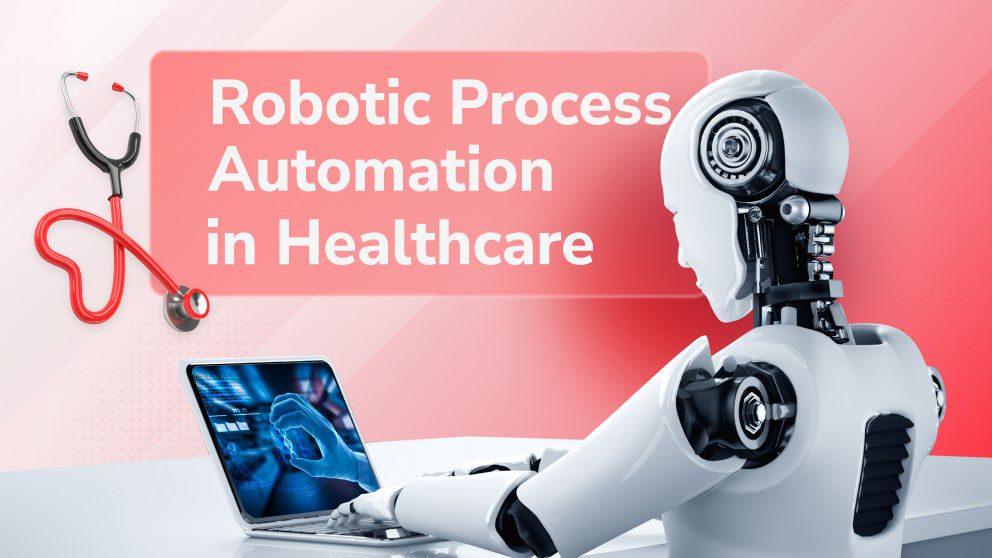Introduction
RPA or Robotic Process Automation is helping streamline operations in the healthcare industry. RPA in healthcare is making many processes efficient. RPA is a technology where bots are used to automate repetitive and rule-based tasks. These human-driven tasks, like data entry, transaction processing, record management, etc., are mimicked by bots. By involving robots, task efficiency is improved and errors are reduced.
In the healthcare sector, service providers are often burdened with administrative work, slowing down all processes. Manual data entry is error-prone. Robotic Process Automation, on the other hand, helps healthcare providers offer better patient care and lets medical professionals focus on delivering quality healthcare services. The use of RPA in healthcare also reduces costs.
In the healthcare industry, RPA is mostly used in tasks like patient scheduling, claims processing, electronic health records (EHR) management, and compliance reporting. With bots around, administrative burdens and costs are reduced.
What is RPA in Healthcare?
Robotic Process Automation uses software bots to imitate human actions, especially in automating rule-based tasks. The use of Robotic Process Automation in healthcare is perfect because the industry is often bogged with repetitive processes, high-volume data and stringent compliance requirements.
Hospitals, clinics, and insurance providers are already using RPA for improving workflow efficiency. For example, many hospitals use RPA in automating patient registration, while insurance companies are using bots for claims processing.
5 Ways RPA Can Transform Your Healthcare Practice
RPA services in healthcare can improve your healthcare practices in many ways.
1. Automating Patient Scheduling & Appointment Management
RPA bots are used to handle appointment bookings, reminders, and cancellations seamlessly.
This benefits your practice in the following ways –
- No-shows are reduced
- Staff can focus on a productive workload
- Enhanced patient experience with timely reminders
2. Streamlining Claims Processing & Billing
Robotic Process Automation is best used for automating basic tasks in the medical insurance industry. These tasks involve insurance verification, claims submissions, and denial management.
Benefits involve –
- Faster reimbursements
- Reduced errors in claims processing
- Reduced administrative costs
3. Enhancing Electronic Health Records (EHR) Management
From managing data entry to updating data and retrieving from EHR, RPA bots finish these tasks fast.
Benefits include:
- More data accuracy
- Minimized manual errors
- Improved compliance with healthcare regulations
4. Improving Inventory & Supply Chain Management
RPA has a big role to play in tracking medical supplies, managing pharmacy inventory, and automating reordering processes.
The benefits include –
- Reduced cases of shortages
- Reduced medical waste
- Procurement optimization and stock management
5. Strengthening Compliance & Reporting
With RPA services in healthcare, regulatory reporting and compliance checks like HIPAA, GDPR, and other international standards, become seamless. Bots maintain audit logs, helping in the process.
Benefits include –
- Reduced compliance risks
- Accurate and timely reporting
- Saved time compared to manual auditing
Real-World Examples of RPA in Healthcare
Many hospitals, clinics, and other healthcare institutions are already implementing RPA successfully. A few case studies to prove the point are –
● Case Study 1: Reducing Billing Errors with RPA
A leading hospital in the country implemented RPA. Over time, they were able to streamline the billing processes. This resulted in the reduction of manual errors. The automation of claims processing, payment verification, and invoice generation, the hospital was successful in reducing billing errors by almost 30%. This hospital was able to speed up the reimbursement process, and disputes were reduced.
● Case Study 2: Enhancing Appointment Scheduling Efficiency
A small clinic was struggling with inefficient appointment scheduling. This led to delays and dissatisfied patients. RPA bots were used to automate scheduling, reminders, and even patient cancellations. This way, the appointment handling time was reduced by almost 50%. This led to fewer no-shows, and optimized staff allocation.
Leading RPA tools that are being used in healthcare include UiPath, Blue Prism, and Automation Anywhere. These tools are helping healthcare units streamline operations and minimise manual workload.
Challenges & Considerations When Implementing RPA
Just like other technologies, RPA in healthcare comes with numerous challenges.
- Integration with Legacy Systems: Most healthcare organizations worldwide are still using outdated software, mostly legacy. This makes RPA integration complex.
- Staff Training: One of the biggest challenges in RPA is that employees need to be trained on a large-scale basis. Resistance to change can be a major issue.
- Data Security Concerns: This is another big challenge because automating sensitive patient information requires stringent security measures.
Best Practices for RPA Adoption
Implementing RPA in healthcare calls for a strategic approach so that healthcare providers get maximum benefits and avoid common pitfalls.
- For RPA automation, it is best to start with small-scale implementations and slowly scale up. Start by testing the effectiveness of RPA in a controlled environment. Take up a pilot project – and implement it in one department or functionality.
- It is also crucial to identify the right processes for automation. This can maximize the impact. Automating processes like patient scheduling, claims processing, insurance verification, appointment management, EHR data entry, invoicing, billing, and regular compliance should be automated on priority.
- RPA should be used only if it is scalable and compliant with industry regulations. Patient data should be encrypted, and regular security audits should be conducted.
- Select the right RPA tools and vendors. Consider factors like scalability, ease of integration, security, compliance, AI, and ML-backed automation.
The Future of RPA in Healthcare
The future of Robotic Process Automation in healthcare is very promising. The gamut of RPA is expected to evolve further as technology changes and may become even more sophisticated.
The following key trends will drive the next phase of RPA in healthcare:
- AI + RPA: This combination of artificial intelligence and RPA in healthcare is likely to make the systems even stronger, facilitating smarter decision-making.
- Predictive Analytics: RPA can be used to offer predictive insights that will, in turn, support proactive healthcare management.
- Telemedicine & Personalized Care: RPA in healthcare has the potential to further support online consultations and empower healthcare providers to offer customized treatment plans.
Conclusion
Robotic Automation Process is changing the way things work in the healthcare industry. The technology automates patient scheduling, claim processing, EHR management, inventory tracking, and compliance.
If you are a healthcare provider, it is time to explore the immense potential of RPA as it automates your key processes, leading to reduced administrative burdens and improving patient outcomes.
Ready to transform your healthcare practice with RPA? Book a demo with us today.


